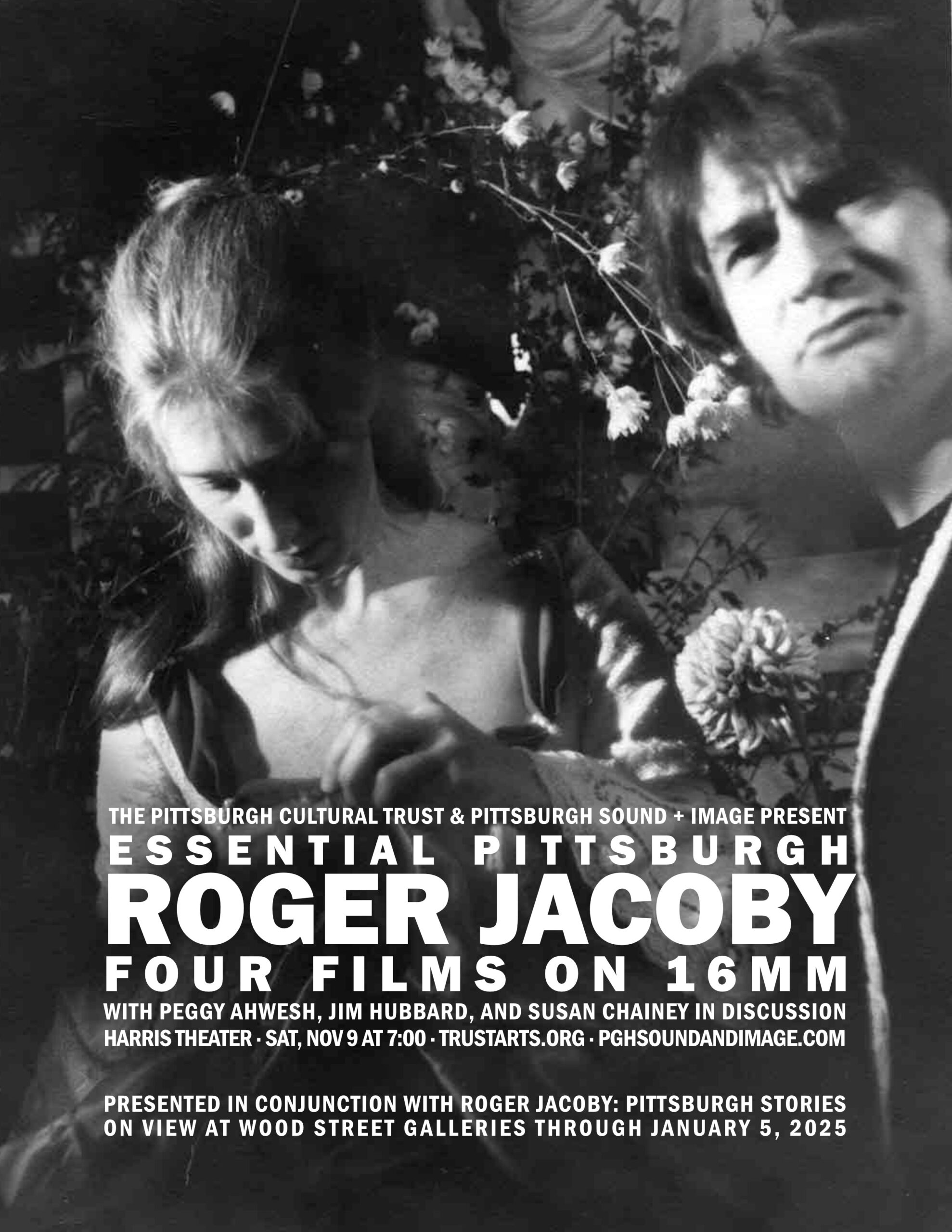In conjunction with Roger Jacoby: Pittsburgh Stories at Wood Street Galleries (through January 5th), Pittsburgh Sound + Image is privileged to present Essential Pittsburgh: Roger Jacoby. This one night only screening event at the Harris Theater convenes in Pittsburgh three people important to Roger’s life: experimental filmmakers Jim Hubbard and Peggy Ahwesh, as well as Roger’s sister Susan Chainey. Together, we will watch 16mm prints of four of Rogers films which are not otherwise included as part of the Wood Street Galleries installation:
Futurist Song (1972)
Floria (1974)
Pearl and Puppet (1975)
Aged in Wood (1975)
These films will be presented from the only prints currently in distribution, which have not screened publicly in years.
About Roger Jacoby and Roger Jacoby: Pittsburgh Stories:
Wood Street Galleries is pleased to present the world premiere of three newly restored experimental films by Roger Jacoby (b. New York, 1944–1985), a pivotal figure bridging the pre- and post-liberation eras of gay experimental filmmaking. This exhibition is the inaugural project in a series of exhibitions and programs dedicated to historic artists who have created significant work in, about, or influenced by the city of Pittsburgh, specifically in the field of time-based or experimental media.
Roger Jacoby’s career as a filmmaker spanned from 1972 until his untimely death from AIDS in 1985, during which he completed eight films—all produced in Pittsburgh. Originally trained as a painter and classical pianist, Jacoby’s artistic journey took a transformative turn through his work as a gallery assistant for his aunt, Rose Fried. This role introduced him to New York’s vibrant artistic circles, including Andy Warhol’s Factory, where he met his long-time partner, the Warhol Superstar Ondine. Encouraged by filmmaker Marie Menken, who gifted him his first film camera, Jacoby began experimenting with film around 1970. Seeking a change in environment, he and Ondine relocated to Pittsburgh in 1972, where Jacoby found a job playing piano for silent films at the Carnegie Museum of Art. There, he connected with Sally Dixon, the museum’s pioneering Film Department founder, who introduced him to the Pittsburgh Filmmakers, then based at the Selma Burke Art Center, a key gathering place for local artists.
Jacoby’s approach to filmmaking was both practical and deeply personal. He began processing his film footage in his own bathroom, using his bathtub as a makeshift darkroom. Even after receiving a National Endowment for the Arts grant in 1972 to acquire more advanced equipment, Jacoby continued hand-processing his films, embracing the unique, handcrafted qualities that became the hallmark of his work. Over the past three years, The Berkeley Art Museum and Pacific Film Archive have meticulously transferred and restored a selection of Jacoby’s early films, with support from the Avant-Garde Masters Grants awarded by The Film Foundation and the National Film Preservation Foundation.
On view at Wood Street Galleries from October 2024 through January 2025 are Dream Sphinx Opera (1973) and L’Amico Fried’s Glamorous Friends (1976), which showcase Jacoby’s innovative use of hand-processing techniques to manipulate film emulsion, resulting in striking abstract imagery. These films feature appearances by Sally Dixon and Ondine, along with other members of Pittsburgh’s art and film communities, set against backdrops that include Phipps Conservatory, Carnegie Music Hall, the Carnegie Museum of Natural History, and various domestic spaces, including Jacoby’s own apartment on Walnut Street in Shadyside. Also on view will be How to Be a Homosexual Part I (1980), in which Jacoby turns his camera on his own community. This film captures intimate portraits of his sister and mother, a deaf friend, and a gay couple from the Gay Activist Alliance, revealing the personal and communal aspects of Jacoby’s work.
These films, marked by Jacoby’s characteristic blending of avant-garde techniques and personal narrative, offer a compelling window into the life and artistic vision of a filmmaker whose work remains a vital part of Pittsburgh’s cultural legacy.
About Essential Pittsburgh:
Pittsburgh Sound + Image seeks to redefine our region’s film history with the Essential Pittsburgh series. Too often when recounting the noteworthy makers who have worked here, we hear the same names. We wish to acknowledge the depth of creativity which has flourished here by spotlighting additional vital artists and their films from the 1960s through the 2000s. This ongoing series is a continuation of our efforts to celebrate a fuller picture of independent, amateur, industrial, and experimental filmmaking talent, and to better situate Pittsburgh nationally as a place of rich cinematic history.

